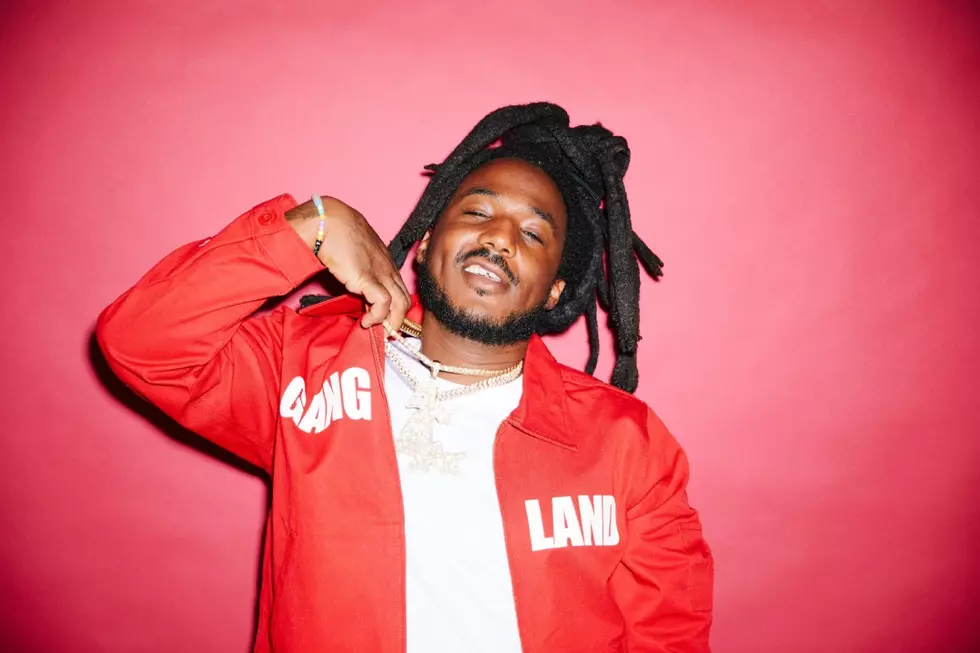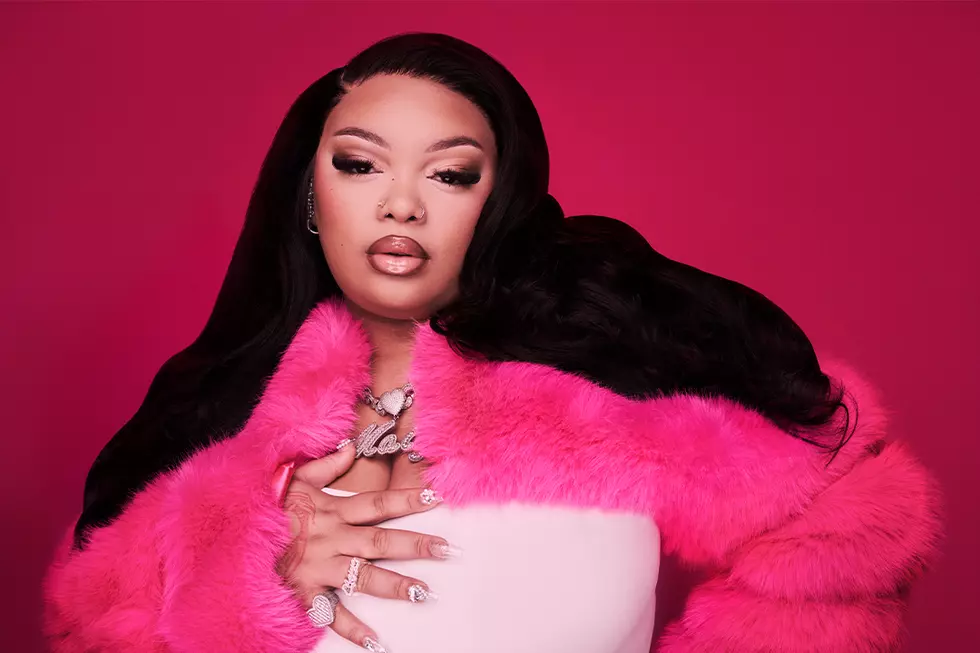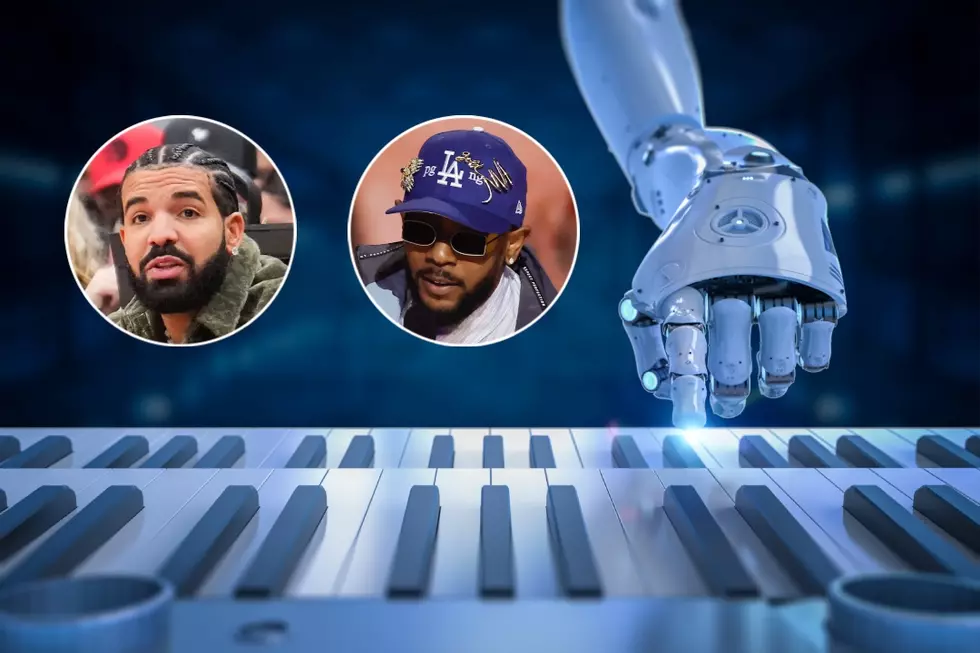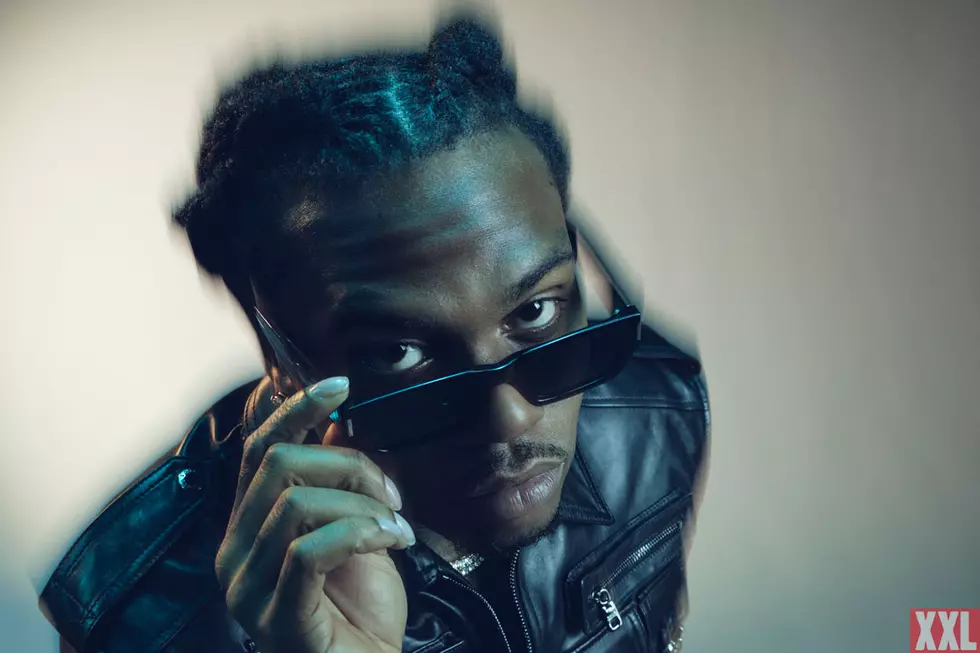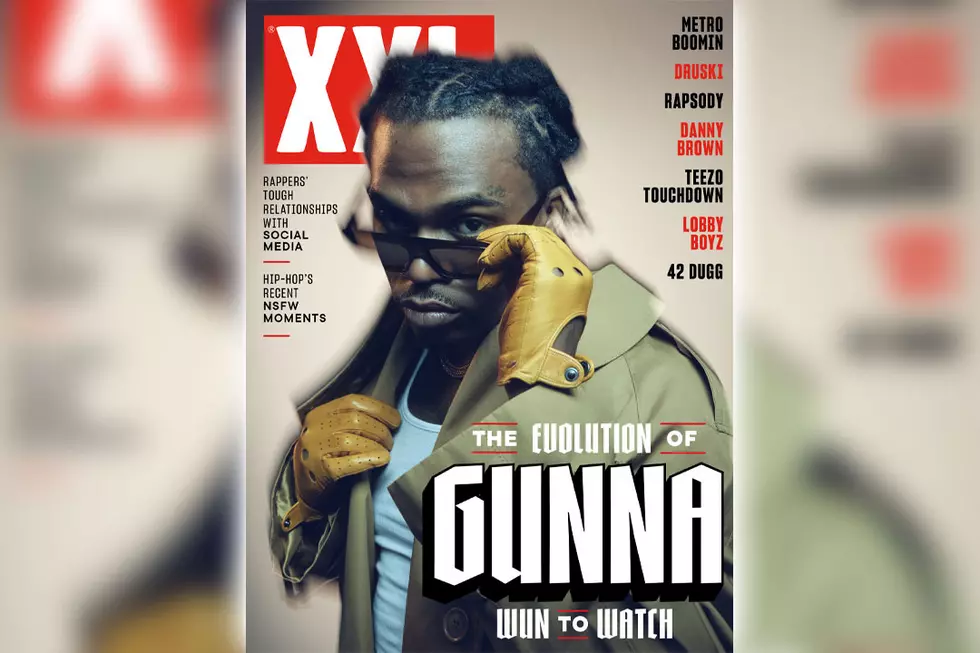
Kid Ink Almost Included Pharrell On His Album
Just over a year since signing a major label deal with RCA Records, L.A. rapper Kid Ink dropped his major label debut, My Own Lane, a week ago (Jan. 7), an entertaining romp with guest spots from Chris Brown, August Alsina, Pusha T and Tyga, to name a few. And with five mixtapes, an independent album and an EP already under his belt, it's about time Kid Ink steps out fully into the mainstream. With his West Coast brethren such as DJ Mustard, YG and Ty Dolla $ign also about to drop major label debuts, it's a new era for the West, separate from the shadow of the titans of the G-Funk era.
Last week, Kid Ink stopped by the XXL offices to pop some bottles, celebrate the release of My Own Lane and talk about working with Chris Brown and DJ Mustard, his peers in the game, and the importance of breaking down barriers. —Dan Rys (@danrys) and Eric Diep (@E_Diep)
How does it feel having the album out now?
It feels like an accomplishment, but not only for me, really for my whole team and all the fans and for everybody who really rode with me to get to this point and help get to this point. I feel like everyone really feels like a part of it, and this is special right now. It feels good to have a major label album out. It came together easily when I did get to the studio; I didn't always have time to get to the studio because of the tours I was on. The Kendrick tour, then I came back for a week and did my own tour for 30 days, then I came back for another week and did a European tour for 15 days, and I had to mix in getting the album done before the European tour, so the last day before the European tour I was recording and went on the flight the next day. I did end up cutting one last record—the Mustard-produced "Rollin'" record, I ended up finishing that in London—so I got one record in out when I was over there, but I still wish I got a couple more records finished just to choose from in the final listing. But I'm 100 percent down with it.
Do you feel like you got all the collaborations that you needed on this album?
I feel like I definitely got all the features that I needed. Some people might feel like it was more than needed, but I felt like it was decent being the fact that, you know, a song with Chris Brown singing the hook is definitely Chris Brown singing the hook, but I'm still doing my verses; it's still a full song from Kid Ink. I just have songs where, I don't wanna sing the hook. I wrote it, but I don't wanna sing it right now, that's just not the zone I'm in. So I have people like Elle Varner who can come in and sing a way bigger hook than me, and Chris and August Alsina, and I also felt it was doper in a way to reach out to those people and show how we rock with each other.
But dream collaborations? I wish I would've gotten one of the Pharrell records on the album. With Pharrell, it's not really about just getting a record done, but it has to sound crazy and right. And he was so busy after that. I got in the studio with him, cut two records, and then he sent me another record, and we were supposed to keep getting back in the studio, and then "Blurred Lines" was gone, "Get Lucky" was gone, Despicable Me 2 came out, and it was a whole wave. But we've definitely been trying to find that time to get back in a session and finish these songs. We've talked about it. It's not like they're lost, it's just the timing, man; people are trying to stay busy.
You've got two Chris Brown records on there, too, including the single "Show Me."
At first we were only planning on having one Mustard record and one Chris Brown record, and we ended up cutting both those at night. The first thought was, choose one of them, and then the other one we'll just have in the arsenal to leak or something like that. Chris ended up putting it on his mixtape at first, which I thought was dope just because it felt like he was co-signing it a little bit more and making it seem real, like it wasn't just a one-time, label favor situation, like he was actually rocking with me. So we ended up getting a crazy response from the record, and had a more turnt up version of the record with me on it, and decided at the end to use it on the album and just see where it goes and let the music speak for itself and not be concerned if people think it's a gimmick or anything like that.
I saw Forbes had a writeup on the album, and they said that the album opens up possibilities—like an artist doesn't have to stick to just one sound all the time.
I've always felt that way about music, but I feel it's a little more open now and it's going a little bit more in that direction if you just own it. Own that, and always make sure you're trying and doing something different and making sure the fans aren't bored. I feel like I've broken different barriers, and people are gonna listen to me more, as an overall artist and not just a radio artist, or a mixtape artist—they're listening for the hook and the lyrics on the verses, so it's dope, man.
What were some of the biggest things you learned, or that changed for you, being on the 2012 XXL Freshman cover?
It just gave me an opportunity to get my face out and open up other people's ears to see what Kid Ink is about. I feel like it gave everybody on the cover a nice shot, a one-time shot that some people took and ran with it, and some people didn't take it and run with it. You can really tell, just from the work, what people were working on, and how people took that. Some people might have gotten it and felt like, "Oh, I didn't really need it," and those are the ones who really did and still need it today. [Laughs] But that just is what it is. It just motivated me to work harder, and all the people I saw before it, you could tell the ones, like I said, and I was like, "I gotta do at least as much, if not more, as these people in order to feel like I can get there, too."
The West Coast is really poppin' off—Mustard, YG, Nipsey, Ty Dolla $ign—how do you feel about that whole West Coast movement?
I think it's about West Coast artists feeling like they needed to do it themselves and not care about the stereotypes. At first, everyone was waiting for co-signs; you were waiting for your Dre or Game or Snoop co-sign. And people even in the city felt like until you got that co-sign, there was nothing really that you could do out of the West Coast. So for everyone to really break out of that and strive—even though the Kendrick situation was with Dre, I didn't feel like it was Dre's sound, Kendrick still did his own thing and made it happen—it's just artists who wanted to break down the barriers. And there's still people like YG and Mustard who can take a sound that was a little bit older and just revamp it and make it their own and make it new, too. Not to say that we can't have a West Coast sound, but just make it different for a new generation. I felt like they definitely did—and including Ty Dolla $ign—they brought something out of the West Coast and have made it something that you might only get from the West Coast at this point.
Who do you think you connect with the most, producer-wise? YG and Mustard are such a team at this point.
I think, producer-wise, me and Mustard have been gettin' it in, gettin' more comfortable in the studio, but someone I'm always rocking with is Ned Cameron. He always makes a big record on every album. He's part of the alumni. It's not that we get a record every time right off top, but we always get that one record by the end of the album that's one of the biggest ones on there, and I think we've done it every project, which is pretty dope. All my videos that have the most views—"I Just Want It All," "Hell And Back," "Time Of Your Life," "Sunset"—these songs are all produced by him. So I can't knock it and say, like, there's not a cool chemistry there. But then at the same time, there are a lot of producers that I do rock out to a lot of demos to; I feel like Vinylz, my dude Diesel, we always just get crazy records out easy. I have millions of hooks—not full songs, just hooks and hooks and hooks—for other people.
You're a producer, too. Do you approach creating tracks differently from a producer angle than from a rapping angle?
Yeah, because I feel like an artist that's concerned more about the lyrics and the verses before the actual song is constructed—when they just hear a beat and they're like, "Ah, this is something I'm going in on"—the quality of the beat doesn't necessarily have to be there. Stuff like that really doesn't matter as much as that verse matters, which is just a different zone. But when I go in the studio, my first thought is always, a catchy melody and seeing how we can take an idea that's not corny or gimmicky and make it catchy enough for people to enjoy. It may go over people's heads, and they think it's something that it's not, but it could really be on some, like, Soulja Boy, "Superman," you know? How you just don't know what the song is about, but at the same time it's a hit record and you just vibe out to it. And that's how I try to approach the music, and make sure, lyrically, it's always about something I'm living in my lifestyle and I'm not telling a lie.
Does the album have a theme?
I don't really approach albums like, "Alright, this is My Own Lane, every record has to be about this," because I felt like that kind of boxes you in. When you come up with the album title first, every time you go in the booth you're like, "Does this fit with this, this and this?" I think you kind of just box yourself in to where, I kind of like to just go in and make music and let it all flow and just see where it all goes. With My Own Lane I really felt like I could dip into different lanes but make them my own by just being Kid Ink on the records. Not letting the beat take over who Kid Ink is. That's what happens to people—they won't be able to keep up with a beat, and then the beat makes that artist, and people will be like, "Oh, I only like him when he's on this type of music." I try to make sure I own the song as much as I can.
Previously: Kid Ink Is Unpredictable And Entertaining On My Own Lane
More From XXL



